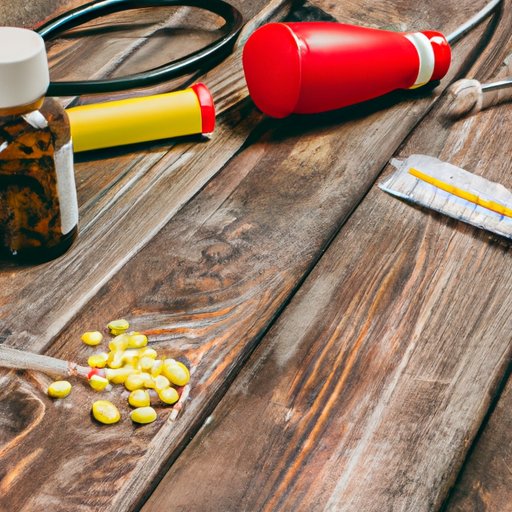Introduction
High blood pressure, also known as hypertension, is a common health condition that affects millions of people worldwide. It happens when the force of blood against the walls of arteries is too high, which can lead to serious health complications such as heart disease and stroke. Managing high blood pressure is crucial to keeping your body healthy and functioning properly. In this article, we’ll explore the various ways you can lower your blood pressure, including medication, lifestyle changes, natural remedies, and coping methods.
Medications for High Blood Pressure
There are different types of medications available to lower blood pressure. Some of the most common ones include:
Diuretics: These medications help the kidneys get rid of excess water and salt from the body, which can lower blood pressure. Common diuretics include hydrochlorothiazide and chlorthalidone.
ACE inhibitors: These medications block the production of a hormone that can narrow blood vessels, making it easier for blood to flow through. Common ACE inhibitors include enalapril and lisinopril.
Beta blockers: These medications reduce the workload on the heart and lower heart rate, which can lower blood pressure. Common beta blockers include atenolol and metoprolol.
Calcium channel blockers: These medications relax the muscles in blood vessels, allowing more blood to flow through and lowering blood pressure. Common calcium channel blockers include amlodipine and nifedipine.
It’s important to work with your healthcare provider to find the right medication that works best for you. Each medication has its own benefits and side effects, and some people may need to take a combination of medications to effectively manage their high blood pressure. Additionally, it’s important to take medication as directed and keep track of any side effects you may experience.
Lifestyle Changes to Lower Blood Pressure
Making lifestyle changes is an important part of managing high blood pressure. Here are some changes you can make to help lower your blood pressure:
Changes in Diet: Eating a diet rich in whole foods, fruits, vegetables, and low-fat dairy can help lower blood pressure. Try to limit your intake of saturated and trans fats, sodium, and processed foods. DASH (Dietary Approaches to Stop Hypertension) is a popular diet that is specifically designed to lower blood pressure.
Exercise: Regular physical activity can help lower blood pressure and improve overall health. Aim for at least 30 minutes of moderate-intensity activity most days of the week.
Stress Management: Stress can cause temporary increases in blood pressure, so it’s important to develop healthy habits to manage stress. Try techniques such as yoga, deep breathing, or meditation to help lower stress levels.
Natural Remedies to Lower Blood Pressure
In addition to medications and lifestyle changes, there are also natural remedies that may help lower blood pressure:
Herbal Supplements: Certain herbs, such as garlic, hawthorn, and basil, have been found to have a positive effect on blood pressure. However, it’s important to talk to your healthcare provider before taking any herbal supplements, as they can interact with medications and cause adverse side effects.
Essential Oils: Essential oils like lavender and ylang-ylang can be used in aromatherapy to help reduce stress and lower blood pressure. However, it’s important to use essential oils safely and consult with a qualified aromatherapist.
Yoga and Meditation: Certain yoga and meditation techniques have been found to help lower blood pressure by reducing stress and promoting relaxation.
Salt Intake and Blood Pressure
Excessive salt intake has been linked to high blood pressure. Here are some tips to help you reduce your salt intake:
Read Labels: Be aware of the sodium content in packaged foods and opt for low-sodium options.
Use Herbs and Spices: Incorporate herbs and spices like garlic, cumin, and oregano into your meals to add flavor without the added sodium.
Limit Processed Foods: Processed foods tend to be high in sodium, so it’s important to limit your intake of them.
Coping with High Blood Pressure
Living with high blood pressure can be difficult, both physically and emotionally. Here are some tips to help you cope:
Reduce Anxiety and Worry: Anxiety and worry can contribute to high blood pressure, so try to find healthy ways to reduce your stress levels. Engage in activities that you enjoy, such as reading, listening to music, or spending time with friends and family.
Stay Motivated: Managing high blood pressure can be a long-term process, so it’s important to stay motivated. Set achievable goals for yourself, such as exercising for 30 minutes per day or trying a new relaxation technique each week.
Conclusion
Lowering blood pressure is crucial to maintaining good health. By making lifestyle changes, trying natural remedies, and working with your healthcare provider to find the right medication, you can effectively manage high blood pressure. Remember to stay motivated and seek resources to help you along the way.
